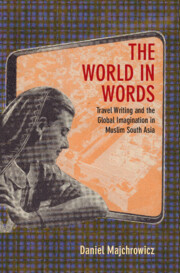3 - The Travel Lesson
Published online by Cambridge University Press: 28 February 2023
Summary
Aminchand’s Safarnama was not just a travelogue. It was also a textbook, mandatory reading in schools across much of northern India. Generations of students in colonial schools of the 1850s and ‘60s read it. Through it, they learned not just about the political and topographical geography of India, but also about how they should imagine it. Rather than seeing India as a variegated territory populated by different groups and divided into independent regions and kingdoms, students were asked to imbibe Aminchand’s aspirational vision that India was indeed a single country united under British rule. At the same time, Aminchand taught students that travel was a valuable and critical component of a sound education. Through books like his, travel and travel writing played a central role in the curriculum from the moment colonial schooling began in 1835.
Travel was important enough that it featured in students’ final exams, too. In 1844, for instance, the English Department at Delhi College asked students to write an essay on “the effects of intercourse with foreigners.” One successful student, Ramchund, answered that these effects were “very beneficial and ennobling”:
A knowledge of the manners of the inhabitants of foreign countries has a tendency to make men liberal, and to generate in them those generous feelings of which man is capable, but which are smothered by the pernicious influence of local prejudices and partialities. It is this very reason why travelling has been recommended, as a necessary part of a liberal education. The mind of the traveler is, as it were, unchained from prejudices, is enlarged and freed from narrow views and considerations, his thoughts take a wider range, and are not confined exclusively to the concerns of the small community in which he lives. He is, as it were, a citizen of the world.… Civilisation and knowledge are the natural offspring of such an intercourse.
Ramchund had learned his travel lesson. He could reflect critically on his society’s shortcomings and aspire to a better life. Ramchund argued, to the approval of his examiners, that Indians were less worldly and less civilized than Europeans in part because they did not travel.
- Type
- Chapter
- Information
- The World in WordsTravel Writing and the Global Imagination in Muslim South Asia, pp. 110 - 130Publisher: Cambridge University PressPrint publication year: 2023

